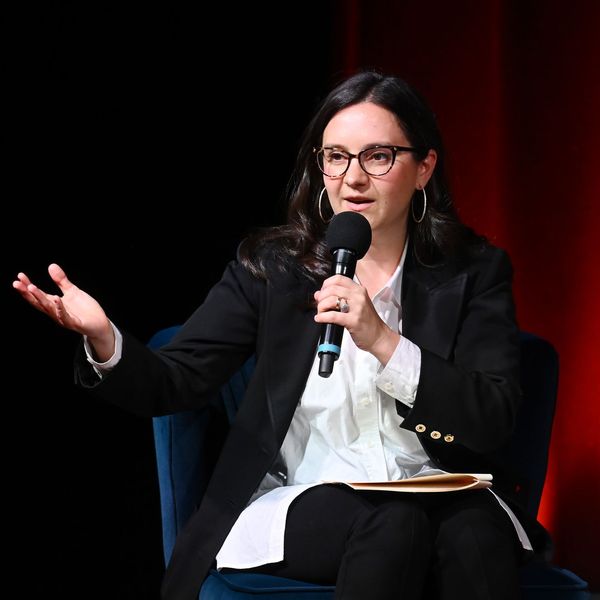Tim Russert and the End of No-Talking-Points Journalism
The passing of Tim Russert leaves us in the midst of an essential election season without the man who had been the steadiest and most serious inquisitor of the powerful during the darkening period when broadcast journalism was degenerating beyond parody.
There will be praise for the host of NBC's "Meet the Press" whose interviews of presidential candidates were often revealing, who still steered discussions toward the neglected concerns of working Americans, who gave rare forums to the dissenting voices of Russ Feingold (five times, most recently as he emerged as the clearest anti-war voice in the Senate) and Ralph Nader (regularly, even after other media outlets stopped asking the consumer advocate to appear), and whose love of politics -- and respect for frequently disregarded constituencies -- was infectious.
There will, as well, be criticism of Russert's 2003 interview of Vice President Dick Cheney on the Sunday before the war in Iraq began; and the fact that when the moment demanded an Edward R. Murrow interrogation we got instead a Larry King-like nod-along with power. Every journalist makes mistakes and this was Russert's most serious. Unfortunately, it came at a time when most media outlets -- broadcast and print -- were making the same mistake of trusting an administration that was owed nothing but skepticism.
Russert would enjoy the praise but accept the criticism.
His was a big, bold persona of the old school -- disinclined toward the preening and pompousness that had come to define his chosen profession. Most importantly, though he had come from the political sphere himself, Russert rejected the "talking-points" approach to electoral analysis that is now practiced on most networks programs.
As someone who has known Russert for more than a quarter century -- since he was an aide to former New York Governor Mario Cuomo and I was a student at Columbia, introduced to the political player from Buffalo by consummate New Yopk journalist Marty Gottlieb -- I can agree with what both John McCain and Barack Obama have said on his passing.
Russert was, as McCain says, "the preeminent political journalist of his generation." And Obama's right that -- even if he faced few competitors in the vast wasteland of what passes for television news and public affairs programming -- "There wasn't a better interviewer in television nor a more thoughtful analyst of our politics, and he was also one of the finest men I knew."
But the best assessment of Russert's premature death came from a pol who shared the "Meet the Press" host's working-class roots and distaste for what has become of broadcast journalism.
Wisconsin Congressman Dave Obey -- the gruff chairman of the House Appropriations Committee -- said it best.
"Tim Russert's death is not just a body blow for NBC News," said Obey, "it is a body blow for the nation and for anyone who cherishes newsmen and women who have remained devoted to reporting hard news in an era increasingly consumed by trivia."
John Nichols is a co-founder of Free Press and the co-author with Robert W. McChesney of TRAGEDY & FARCE: How the American Media Sell Wars, Spin Elections, and Destroy Democracy - The New Press.
(c) 2008 The Nation
An Urgent Message From Our Co-Founder
Dear Common Dreams reader, The U.S. is on a fast track to authoritarianism like nothing I've ever seen. Meanwhile, corporate news outlets are utterly capitulating to Trump, twisting their coverage to avoid drawing his ire while lining up to stuff cash in his pockets. That's why I believe that Common Dreams is doing the best and most consequential reporting that we've ever done. Our small but mighty team is a progressive reporting powerhouse, covering the news every day that the corporate media never will. Our mission has always been simple: To inform. To inspire. And to ignite change for the common good. Now here's the key piece that I want all our readers to understand: None of this would be possible without your financial support. That's not just some fundraising cliche. It's the absolute and literal truth. We don't accept corporate advertising and never will. We don't have a paywall because we don't think people should be blocked from critical news based on their ability to pay. Everything we do is funded by the donations of readers like you. Will you donate now to help power the nonprofit, independent reporting of Common Dreams? Thank you for being a vital member of our community. Together, we can keep independent journalism alive when it’s needed most. - Craig Brown, Co-founder |
The passing of Tim Russert leaves us in the midst of an essential election season without the man who had been the steadiest and most serious inquisitor of the powerful during the darkening period when broadcast journalism was degenerating beyond parody.
There will be praise for the host of NBC's "Meet the Press" whose interviews of presidential candidates were often revealing, who still steered discussions toward the neglected concerns of working Americans, who gave rare forums to the dissenting voices of Russ Feingold (five times, most recently as he emerged as the clearest anti-war voice in the Senate) and Ralph Nader (regularly, even after other media outlets stopped asking the consumer advocate to appear), and whose love of politics -- and respect for frequently disregarded constituencies -- was infectious.
There will, as well, be criticism of Russert's 2003 interview of Vice President Dick Cheney on the Sunday before the war in Iraq began; and the fact that when the moment demanded an Edward R. Murrow interrogation we got instead a Larry King-like nod-along with power. Every journalist makes mistakes and this was Russert's most serious. Unfortunately, it came at a time when most media outlets -- broadcast and print -- were making the same mistake of trusting an administration that was owed nothing but skepticism.
Russert would enjoy the praise but accept the criticism.
His was a big, bold persona of the old school -- disinclined toward the preening and pompousness that had come to define his chosen profession. Most importantly, though he had come from the political sphere himself, Russert rejected the "talking-points" approach to electoral analysis that is now practiced on most networks programs.
As someone who has known Russert for more than a quarter century -- since he was an aide to former New York Governor Mario Cuomo and I was a student at Columbia, introduced to the political player from Buffalo by consummate New Yopk journalist Marty Gottlieb -- I can agree with what both John McCain and Barack Obama have said on his passing.
Russert was, as McCain says, "the preeminent political journalist of his generation." And Obama's right that -- even if he faced few competitors in the vast wasteland of what passes for television news and public affairs programming -- "There wasn't a better interviewer in television nor a more thoughtful analyst of our politics, and he was also one of the finest men I knew."
But the best assessment of Russert's premature death came from a pol who shared the "Meet the Press" host's working-class roots and distaste for what has become of broadcast journalism.
Wisconsin Congressman Dave Obey -- the gruff chairman of the House Appropriations Committee -- said it best.
"Tim Russert's death is not just a body blow for NBC News," said Obey, "it is a body blow for the nation and for anyone who cherishes newsmen and women who have remained devoted to reporting hard news in an era increasingly consumed by trivia."
John Nichols is a co-founder of Free Press and the co-author with Robert W. McChesney of TRAGEDY & FARCE: How the American Media Sell Wars, Spin Elections, and Destroy Democracy - The New Press.
(c) 2008 The Nation
The passing of Tim Russert leaves us in the midst of an essential election season without the man who had been the steadiest and most serious inquisitor of the powerful during the darkening period when broadcast journalism was degenerating beyond parody.
There will be praise for the host of NBC's "Meet the Press" whose interviews of presidential candidates were often revealing, who still steered discussions toward the neglected concerns of working Americans, who gave rare forums to the dissenting voices of Russ Feingold (five times, most recently as he emerged as the clearest anti-war voice in the Senate) and Ralph Nader (regularly, even after other media outlets stopped asking the consumer advocate to appear), and whose love of politics -- and respect for frequently disregarded constituencies -- was infectious.
There will, as well, be criticism of Russert's 2003 interview of Vice President Dick Cheney on the Sunday before the war in Iraq began; and the fact that when the moment demanded an Edward R. Murrow interrogation we got instead a Larry King-like nod-along with power. Every journalist makes mistakes and this was Russert's most serious. Unfortunately, it came at a time when most media outlets -- broadcast and print -- were making the same mistake of trusting an administration that was owed nothing but skepticism.
Russert would enjoy the praise but accept the criticism.
His was a big, bold persona of the old school -- disinclined toward the preening and pompousness that had come to define his chosen profession. Most importantly, though he had come from the political sphere himself, Russert rejected the "talking-points" approach to electoral analysis that is now practiced on most networks programs.
As someone who has known Russert for more than a quarter century -- since he was an aide to former New York Governor Mario Cuomo and I was a student at Columbia, introduced to the political player from Buffalo by consummate New Yopk journalist Marty Gottlieb -- I can agree with what both John McCain and Barack Obama have said on his passing.
Russert was, as McCain says, "the preeminent political journalist of his generation." And Obama's right that -- even if he faced few competitors in the vast wasteland of what passes for television news and public affairs programming -- "There wasn't a better interviewer in television nor a more thoughtful analyst of our politics, and he was also one of the finest men I knew."
But the best assessment of Russert's premature death came from a pol who shared the "Meet the Press" host's working-class roots and distaste for what has become of broadcast journalism.
Wisconsin Congressman Dave Obey -- the gruff chairman of the House Appropriations Committee -- said it best.
"Tim Russert's death is not just a body blow for NBC News," said Obey, "it is a body blow for the nation and for anyone who cherishes newsmen and women who have remained devoted to reporting hard news in an era increasingly consumed by trivia."
John Nichols is a co-founder of Free Press and the co-author with Robert W. McChesney of TRAGEDY & FARCE: How the American Media Sell Wars, Spin Elections, and Destroy Democracy - The New Press.
(c) 2008 The Nation

